Greetings, tea lovers! If you’re looking for a fruit tea that bursts with flavor but doesn’t include hibiscus, you’re in for a treat. In this zesty guide, I’ll take you on a journey through the world of fruit tea without hibiscus, sharing the best fruits to use, brewing methods, and recommended teas to try. So, let’s dive in and explore the vibrant and refreshing world of non-hibiscus fruit tea!”
Key Takeaways
- Fruit tea without hibiscus is a flavorful and versatile option for tea lovers.
- Brewing fruit tea without hibiscus can be done with fruit tea bags, loose leaf tea, or fresh fruit.
- Popular fruits for fruit tea include lemon, apple, lime, summer berries, orange, cranberry, elderberry, and peach.
- Non-fruity tea options, such as floral, earthy, spicy, nutty, and woody teas, provide diverse flavors.
- Fruit tea without hibiscus offers benefits like being caffeine-free and rich in antioxidants.
What is Fruit Tea?
Fruit tea is a delightful infusion made by steeping pieces of fruit in water. Unlike fruit juice, which involves extracting the juice by squeezing and compressing fruits, fruit tea allows the flavors of the fruit to seamlessly infuse into the water. It’s a refreshing and flavorful beverage that can be enjoyed hot or iced, making it a versatile choice for any time of the day.
One of the most appealing characteristics of fruit tea is its versatility. It can be made with a wide variety of fruits, each contributing its own unique flavor profile. Popular fruit choices for tea infusions include:
- Lemon: Known for its invigorating and tangy taste, lemon adds a zesty kick to fruit tea.
- Apple: With its subtly sweet and rounded flavor, apple enhances the overall richness of fruit tea.
- Lime: Lime adds a tropical note to fruit tea, infusing it with a refreshing and citrusy taste.
- Summer berries: Berries like strawberries, raspberries, and blueberries offer a burst of tart sweetness that complements the other flavors in fruit tea.
- Orange: Orange lends a fragrant and slightly floral taste to fruit tea, creating a delightful aroma.
- Cranberry: If you prefer a tart and slightly drying quality, cranberries make a great choice for fruit tea.
- Elderberry: Known for its unique flavor and potential health benefits, elderberries add depth to fruit tea blends.
- Peach: A ripe, juicy peach can infuse fruit tea with its luscious and sweet flavor.
Aside from fruits, fruit tea can also incorporate other ingredients such as herbs, spices, and flowers to create more complex and intriguing flavor combinations. These additional ingredients can elevate the taste and aroma of fruit tea, resulting in a truly captivating sensory experience.
With its vibrantly colored brew and aromatic essence, fruit tea is not only a delightful beverage but also a feast for the eyes. Its tantalizing flavors and refreshing qualities make it a perfect choice for those seeking a caffeine-free yet invigorating tea option.
Let’s explore the world of fruit tea and discover the perfect flavors for your taste buds!
Brewing Fruit Tea
Brewing fruit tea is a simple and flexible process that allows you to enjoy the delicious flavors of fresh fruits in a hot or cold beverage. Whether you prefer the convenience of tea bags, the versatility of loose leaf tea, or the vibrant taste of fresh fruit-infused tea, there are various methods to create your perfect cup. Let’s explore different ways to brew fruit tea:
Brewing with Fruit Tea Bags
If you’re looking for a convenient and quick option, fruit tea bags are a great choice. Here’s how to brew fruit tea using tea bags:
- Place one fruit tea bag in a mug.
- Pour hot water over the tea bag.
- Steep the tea bag for the recommended time according to the instructions.
- After steeping, remove the tea bag from the mug.
- Your delicious fruit tea is ready to be enjoyed!
Brewing with Loose Leaf Fruit Tea
If you prefer the freedom to customize the strength and flavor of your fruit tea, loose leaf fruit tea is the way to go. Here’s how to brew loose leaf fruit tea:
- Use a metal infuser or a fillable paper teabag.
- Add a teaspoon of loose leaf fruit tea to the infuser or teabag.
- Place the infuser or teabag in your mug.
- Pour hot water over the tea and let it steep for the desired time.
- Remove the infuser or teabag from the mug.
- Your flavorful loose leaf fruit tea is ready to be savored!
Brewing Fresh Fruit Tea
For the freshest and most vibrant fruit tea experience, you can create your own fresh fruit-infused tea. Follow these steps to brew fresh fruit tea:
- Cut up fresh fruits into smaller pieces.
- Add the fruit pieces to a jug or teapot.
- Pour boiling water over the fruits.
- Let the fruit and water steep for a few minutes.
- Strain the infused tea into cups or mugs.
- Enjoy the refreshing taste of your homemade fresh fruit tea!
With these brewing methods, you can easily prepare a delicious cup of fruit tea to satisfy your cravings for fruity flavors. Whether you choose the convenience of tea bags, the versatility of loose leaf tea, or the freshness of homemade fruit tea, each method offers a unique and delightful brewing experience. Now, it’s time to get brewing and enjoy the fruity goodness of fruit tea!
Popular Fruits for Fruit Tea
When it comes to creating delicious and flavorful fruit tea, incorporating the right fruits is key. Let’s explore some popular fruits that make great additions to fruit tea:
Lemon:
A squeeze of lemon can add a refreshing and zesty flavor to your fruit tea. It provides a bright and tangy taste that pairs well with various fruits and botanicals.
Apple:
For a subtly sweet and rounded taste, apple is an excellent choice. It adds a natural sweetness to your tea and complements other flavors beautifully.
Lime:
Looking to add a tropical twist to your fruit tea? Consider using lime. It brings a vibrant and citrusy note that transports you to sunny shores with each sip.
Summer Berries:
Whether it’s strawberries, raspberries, blueberries, or blackberries, summer berries lend a tart sweetness to your tea. They add a burst of flavor and vibrant color to your cup.
Orange:
When you want a fruit tea with a fragrant and slightly floral taste, orange is a wonderful choice. It infuses your tea with a delightful aroma and a hint of natural sweetness.
Cranberry:
If you enjoy a tart and refreshing flavor, cranberries are a great addition to your fruit tea. They bring a tangy and slightly drying quality, creating a balanced and invigorating blend.
Elderberry:
Elderberries not only offer a unique flavor to your tea but also potential health benefits. They have a rich and distinctive taste that adds depth and complexity to your cup.
Peach:
For a sweet and juicy flavor, peach is a perfect choice. It contributes a luscious and slightly slick taste that pairs well with a range of other fruits and herbs.
Experiment with these popular fruits to create your own delightful fruit tea blends. Combine different fruits, adjust the ratios to suit your taste, and let your creativity shine.
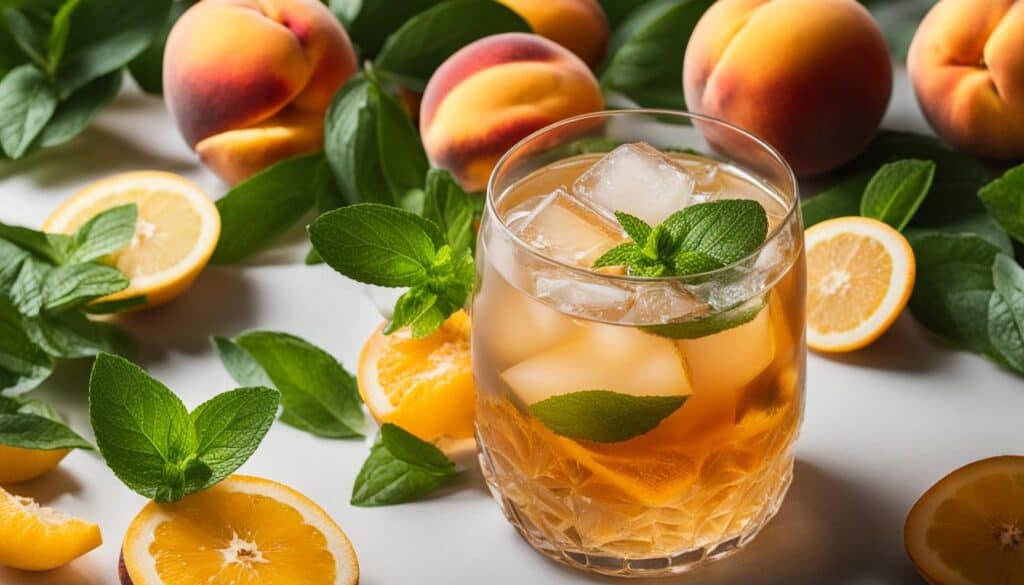
Stay tuned for the upcoming section where we’ll explore other options for non-fruity teas.
Non-Fruity Tea Options
If you’re looking to explore beyond fruity teas, there is a wide range of non-fruity options that offer diverse flavors. These teas are perfect for those who prefer a different taste profile or want to try something new. From floral and earthy to spicy and nutty, there’s a non-fruity tea for everyone.
Floral Teas
One popular non-fruity tea category is floral teas. These teas are infused with aromatic flowers, adding a delicate and fragrant note to your cup. Jasmine tea, with its subtle sweetness, and rose tea, known for its romantic essence, are two floral tea varieties that tea enthusiasts often enjoy.
Earthy Teas
Earthy teas are another interesting option to explore. These teas have a deep, robust flavor profile with earthy undertones. Pu-erh tea, known for its earthy and smooth taste, and dandelion root tea, with its rich, nutty notes, are excellent choices for those who prefer a more grounded tea experience.
Spicy Teas
If you enjoy a bolder and more invigorating flavor, spicy teas might be your go-to option. Chai tea, with its blend of warming spices like cinnamon, cardamom, and cloves, offers a complex and comforting taste. Ginger tea, known for its fiery kick, is another spicy tea that can awaken your senses and add a little heat to your day.
Nutty Teas
If you’re a fan of nutty flavors, nutty teas can be a delightful choice. Almond tea, with its smooth and nutty profile, and hazelnut tea, with its rich and aromatic notes, can provide a comforting and indulgent tea experience. These teas are perfect for those looking to savor the natural flavors of nuts in their cup.
Woody Teas
For those who appreciate deep and robust flavors, woody teas are a great option. Oolong tea, with its complex aroma and slightly woody taste, is a popular choice among tea connoisseurs. Black tea, with its bold and rich flavor profile, also falls under the category of woody teas and offers a satisfyingly deep brew.
Single-Origin Teas
If you want to explore the distinct flavors that different tea regions have to offer, single-origin teas are worth trying. These teas are made from the leaves of a single tea plant, allowing you to discover the nuances and uniqueness of each terroir. From the delicate floral notes of Darjeeling tea to the rich earthiness of Yunnan tea, single-origin teas offer a fascinating journey through the world of tea.
Whether you’re craving a subtle floral tea, a robust and earthy brew, or a spicy and invigorating cup, non-fruity teas provide a diverse range of flavors to explore. Don’t be afraid to venture beyond fruit-infused blends and embrace the intriguing taste profiles that non-fruity teas have to offer.
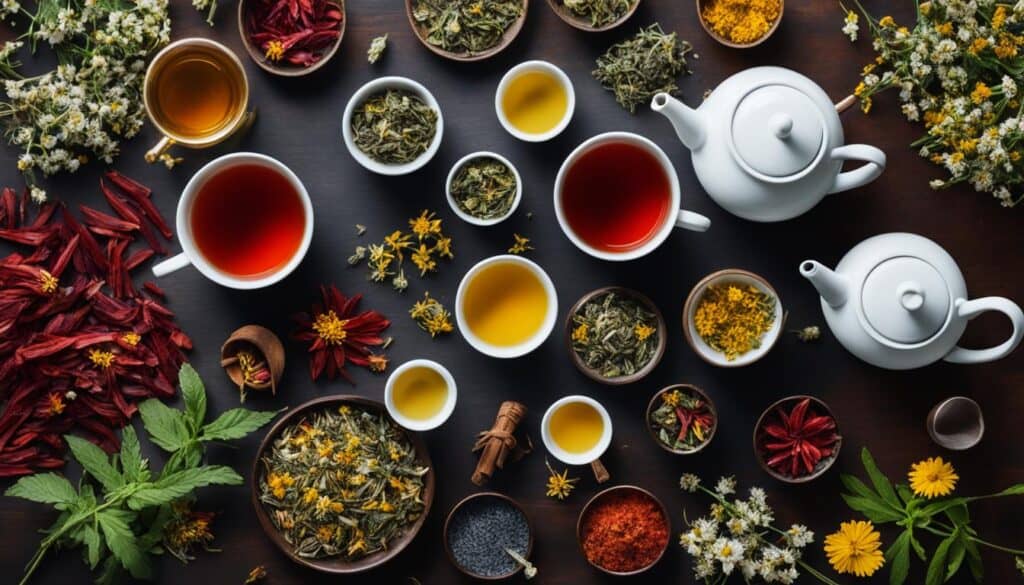
Brewing and Enjoying Non-Fruity Teas
When it comes to brewing non-fruity teas, the process is quite similar to brewing fruity teas. However, it’s essential to understand that the recommended steeping time may vary depending on the type of non-fruity tea you’re brewing. The individual characteristics of different teas play a crucial role in determining the perfect brewing time to achieve the desired flavor and aroma.
Whether you prefer your non-fruity tea hot or cold, there are various ways to enjoy these delightful blends. Non-fruity teas can be consumed plain, allowing you to savor their natural flavors, or you can experiment with additions like sweeteners or milk to suit your taste preferences. These teas can be incredibly versatile and can be incorporated into various recipes, enhancing the depth and complexity of their flavors.
Exploring the World of Non-Fruity Teas
Non-fruity teas offer a diverse range of flavors that can tickle your taste buds and provide a unique sensory experience. Here are some popular non-fruity tea options worth exploring:
- Floral Teas: Jasmine and rose teas captivate with their delicate floral aromas and soothing flavors.
- Earthy Teas: Pu-erh and dandelion root teas offer deep, earthy tones that create a sense of grounding and warmth.
- Spicy Teas: Chai and ginger teas provide a delightful kick of spice that awakens the senses and adds a touch of warmth.
- Nutty Teas: Almond and hazelnut teas offer a rich and creamy nuttiness that can be absolutely satisfying.
- Woody Teas: Oolong and black teas boast robust and woody flavors that are bold and invigorating.
Additionally, single-origin teas are an excellent choice for those seeking a unique and authentic tea experience. These teas, carefully crafted from the leaves of a single tea plant, showcase the distinctive flavors characteristic of their specific origin.
Now that you have an introduction to the world of non-fruity teas, it’s time to explore and savor the incredible flavors they have to offer. Whether you’re a fan of floral notes, earthy tones, spicy kicks, nutty richness, or woody intensity, there’s a non-fruity tea waiting for you.
“Non-fruity teas offer a diverse range of flavors that can tickle your taste buds and provide a unique sensory experience.”
| Type of Non-Fruity Tea | Recommended Steeping Time |
|---|---|
| Floral Teas (Jasmine, Rose) | 2-3 minutes |
| Earthy Teas (Pu-erh, Dandelion Root) | 3-5 minutes |
| Spicy Teas (Chai, Ginger) | 3-4 minutes |
| Nutty Teas (Almond, Hazelnut) | 4-5 minutes |
| Woody Teas (Oolong, Black Tea) | 3-5 minutes |
| Single-Origin Teas | Varies based on tea type and origin |
Benefits of Fruit Tea Without Hibiscus
Fruit tea without hibiscus offers a delightful array of benefits, making it a fantastic choice for tea enthusiasts seeking a caffeine-free and flavorful experience. Let’s delve into the advantages that this zesty tea brings:
Caffeine-Free Delight
Fruit tea without hibiscus provides an excellent alternative for individuals looking to steer clear of caffeine. Unlike traditional tea varieties, this vibrant infusion offers a naturally invigorating experience without any caffeine content.
Antioxidant Powerhouse
Abundant in antioxidants, fruit tea without hibiscus supports overall health and wellness. Antioxidants play a vital role in combating free radicals, helping to protect the body from oxidative stress and maintain cellular health.
Refreshingly Flavorful
Indulging in fruit tea without hibiscus is a treat for the taste buds. Bursting with invigorating flavors, this tea encompasses the essence of various fruits, offering a refreshing and satisfying sensation with every sip.
Experience the multiple advantages of fruit tea without hibiscus and savor its caffeine-free goodness, potent antioxidants, and sensational flavors.
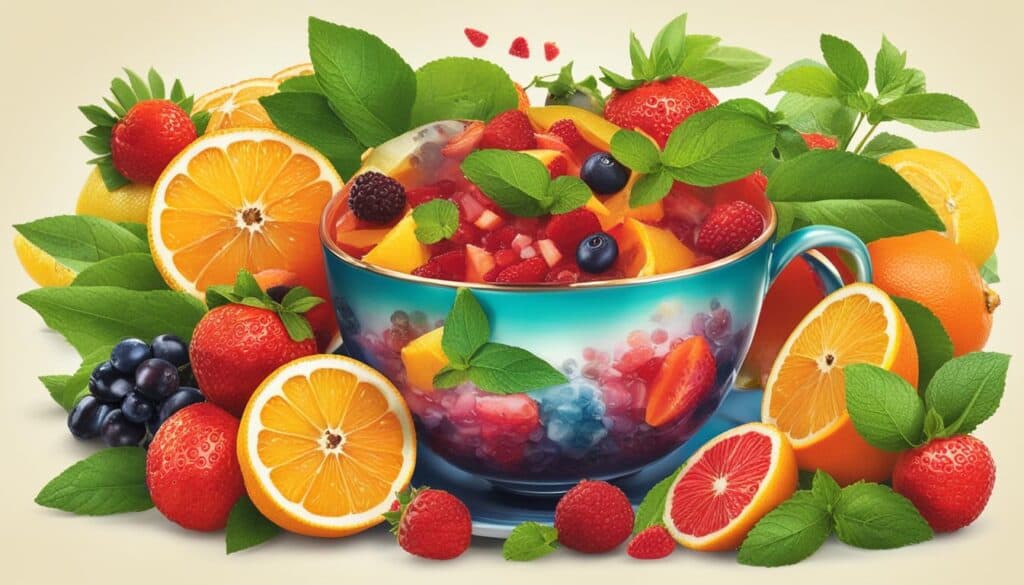
Recommendations and Brands
When it comes to fruit tea without hibiscus, there are several brands that offer delicious and hibiscus-free options. Here are some popular recommendations to consider:
1. Good Earth’s Sweet and Spicy Tea
Good Earth’s Sweet and Spicy Tea is a flavorful blend of herbs and spices that will tantalize your taste buds. This tea offers a unique combination of sweetness and spiciness, making it a perfect choice for those looking to explore new flavor profiles.
2. Blue Lotus Masala Chai Tea
If you’re a fan of masala chai, you’ll love the hibiscus-free option from Blue Lotus. Their Masala Chai Tea is aromatic and filled with warm and comforting spices like cardamom, cinnamon, and cloves. It’s the perfect beverage to cozy up with on a chilly day.
3. Herbal Teas from David’s Tea
David’s Tea offers a wide variety of herbal teas that are free from hibiscus. From fruity blends like Forever Nuts and Just Peachy to soothing herbal options like Peppermint and Lemon Ginger, their collection has something for everyone.
4. Other Brands
In addition to the above recommendations, there are other well-known brands that offer a range of flavorful and hibiscus-free fruit teas. Consider exploring options from Numi, Tazo, Yogi, and Celestial Seasonings.
With these brands and recommendations, you can enjoy the vibrant flavors of fruit tea without the presence of hibiscus. Whether you prefer a spicy blend, a fragrant chai, or a refreshing herbal infusion, there’s a hibiscus-free fruit tea out there to suit your taste preferences.
Fruit Teas and Health
Fruit tea, including fruit tea without hibiscus, offers a range of health benefits. This refreshing beverage is not only hydrating but also contains natural sugars that provide a quick energy boost. Additionally, fruit tea may possess antioxidant and anti-inflammatory properties, thanks to the vitamins, minerals, and phytochemicals present in the fruits used.
While scientific research has yet to establish a direct link between fruit tea and weight loss, incorporating it into a balanced diet can contribute to overall calorie reduction. By substituting high-calorie beverages with low-calorie fruit tea, you can satisfy your cravings for a flavorful and refreshing drink without the added calories.
So whether you’re looking for a tasty and healthy alternative to sugary drinks or simply want to enjoy the vibrant flavors of fruits, fruit tea without hibiscus is an excellent choice that can support your well-being.
Health Benefits of Fruit Tea:
- Hydrating
- Provides natural sugars for quick energy
- Potential antioxidant and anti-inflammatory properties
- Low in calories, aiding in overall calorie reduction
“Incorporating fruit tea into a balanced diet can help reduce calorie intake while maintaining a delicious and refreshing beverage option.”
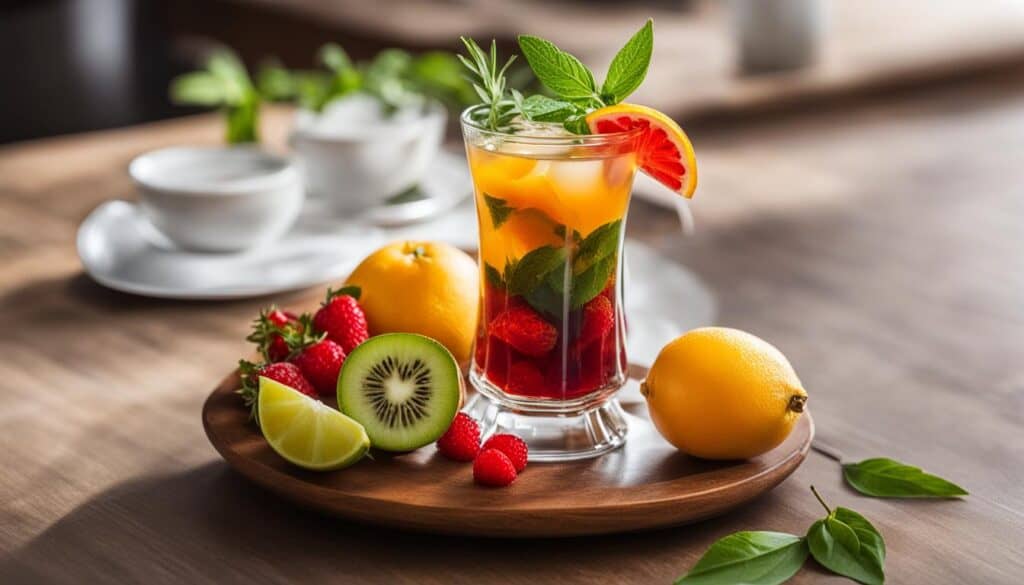
Anecdotal Evidence and Weight Loss Claims:
Although there are anecdotal accounts of individuals attributing weight loss to the consumption of fruit tea, it’s important to approach such claims with caution. The effects of weight loss are influenced by various factors, including overall dietary patterns, physical activity levels, and individual metabolism. Therefore, while fruit tea can be a part of a healthy weight management strategy, it should not be relied upon as a sole method for achieving weight loss goals.
Conclusion
In conclusion, fruit tea without hibiscus is a delicious and invigorating choice for tea enthusiasts. The absence of hibiscus allows the natural flavors of various fruits and botanicals to shine, creating a truly refreshing experience. Whether you have a preference for fruity or non-fruity teas, there is a wide selection of options to suit your taste preferences.
By exploring the world of fruit tea without hibiscus, you can indulge in the vibrant flavors of lemon, apple, lime, summer berries, orange, cranberry, elderberry, and peach, among others. These fruits not only add a burst of taste but also offer potential health benefits.
So why wait? Treat yourself to the zesty goodness of fruit tea without hibiscus and embark on a delightful journey of tantalizing flavors. Whether you enjoy it hot or cold, this refreshing beverage is sure to satisfy your cravings and provide a much-needed pick-me-up throughout the day.
FAQ
What is fruit tea without hibiscus?
Fruit tea without hibiscus is a type of tea that is made by infusing pieces of fruit in water, without the use of hibiscus as an ingredient.
How do I brew fruit tea without hibiscus?
Brewing fruit tea without hibiscus is a simple process. For fruit tea bags, steep one teabag in hot water for the recommended time. For loose leaf fruit tea, use an infuser or teabag and steep for the desired time. To make fresh fruit tea, cut up fresh fruit, pour boiling water over it, steep, and strain before serving.
What fruits can I use for fruit tea without hibiscus?
You can use a variety of fruits for fruit tea without hibiscus, including lemon, apple, lime, summer berries, orange, cranberry, elderberry, and peach.
What are some non-fruity tea options?
Non-fruity teas include floral teas like jasmine and rose, earthy teas like pu-erh and dandelion root, spicy teas like chai and ginger, nutty teas like almond and hazelnut, woody teas like oolong and black tea, and single-origin teas made from the leaves of a single tea plant.
How do I brew and enjoy non-fruity teas?
Non-fruity teas can be brewed using similar methods as fruity teas. The recommended steeping time varies depending on the type of non-fruity tea. Non-fruity teas can be enjoyed hot or cold and can be consumed plain or with added sweetener or milk. They can also be used in various recipes.
What are the benefits of fruit tea without hibiscus?
Fruit tea without hibiscus is caffeine-free and rich in antioxidants. It offers a refreshing and flavorful experience without the presence of hibiscus.
Which brands offer fruit tea without hibiscus?
Some popular brands that offer hibiscus-free fruit teas include Good Earth, Blue Lotus, David’s Tea, Numi, Tazo, Yogi, and Celestial Seasonings.
What are the health benefits of fruit tea?
Fruit tea is hydrating, contains natural sugars for energy, and may have antioxidant and anti-inflammatory properties. While it is not directly linked to weight loss, it can be a low-calorie alternative to high-calorie beverages.

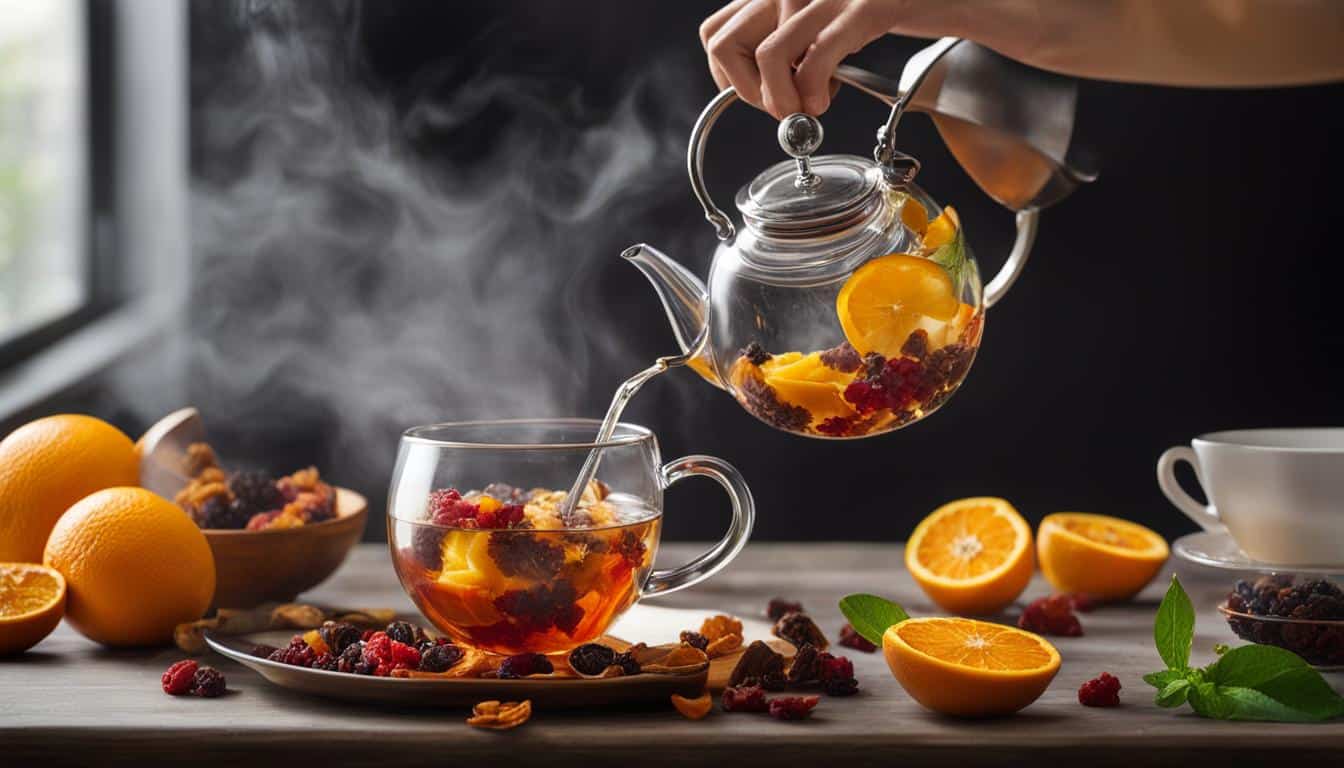



Leave a Reply